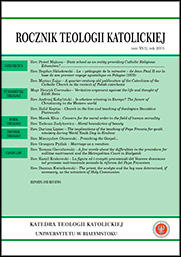Veritative argument against the life and thought of Edith Stein
Veritative argument against the life and thought of Edith Stein
Author(s): Henryk CiereszkoSubject(s): Systematic Theology, Pastoral Theology
Published by: Wydawnictwo Uniwersytetu w Białymstoku
Keywords: veritative argument; the credibility of the Christian Revelation; the ultimate Truth the personal Truth; the motives of credibility of Christian Revelation; Edith Stein
Summary/Abstract: This article has attempted to demonstrate the practical verification of the veritative argument in the life of Edith Stein and to indicate the possibility of taking advantage of her conclusions in the construction of the argument, especially in terms of strengthening its motivational merit. That argument serves to justify the credibility of the divine and Christian revelation by demonstrating that the source of all truth is God, who is also the ultimate truth that explains the meaning of human life and all that exists. Edith Stein, while looking for the truth and meaning of life, found God, the highest Truth. Through the encounter with God she discovered her destiny, a life spent in union with Him in eternity. Her path to the truth and God bears the marks of the process of reaching the ultimate truth, the God of revelation, and this process is included in the structure of the veritative argument. In this way, the experience of Edith Stein can be considered as a practical verifi cation of that argument. In addition, in her philosophical and theological inquiry, one can fi nd the mystery of God, personal truth, essential for the recognition of God as the ultimate truth, which is vital in understanding veritative argument. The truth of God in her approach has three dimensions: personal, relational, and explanatory. Such perceived truth serves for better understanding of the meaning of human life, especially in religious dimension, which is also crucial in veritative argument. Edith Stein showed in her anthropology that man nhas an innate predisposition to seek the truth, and her knowledge had a positive eff ect on the development of man and his life, which is signifi cant in investigating the sources of the argument. Stages in the process of searching the truth, distinguished by Edith Stein, (the attitude of intellectual openness to reality, good will in the quest to uncover the truth, determination and consistency in seeking, the attitude of „empathy”, humility opening up to the transcendent) converge with internal symptoms: dependency on eff ectiveness of the argument, or on its motivational value, enriching and expanding the argument. Similarly, external conditions which had a positive impact on the process (living environment and education, Husserl’s phenomenological method, testimony Christians’ life in faith) correspond to and reinforce the subject (objective) circumstances of the eff ectiveness of the argument.
Journal: Rocznik Teologii Katolickiej
- Issue Year: 15/2016
- Issue No: 2
- Page Range: 55-77
- Page Count: 23
- Language: English

